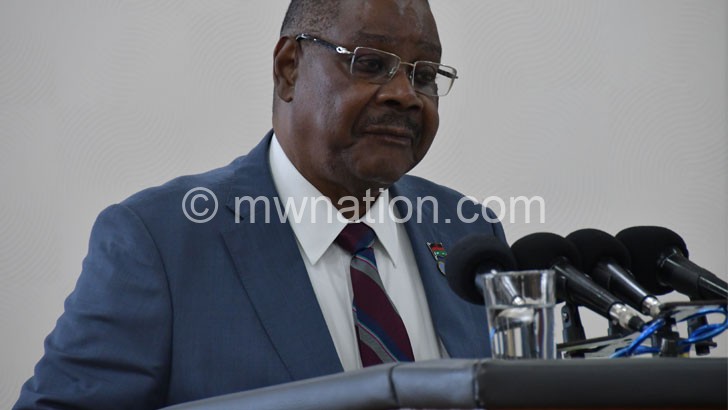Court faults APM
The High Court has faulted former president Peter Mutharika for attempting to mislead Malawians by suggesting that Parliament was superior to the country’s courts.
In his ruling on a judicial review case on the attempt to send on forced leave pending retirement Chief Justice Andrew Nyirenda and Justice of Appeal Edward Twea, High Court Judge Charles Mkandawire observed that according to the country’s Constitution, all the three arms of government—the Executive, the Judiciary and the Legislature—were equal with separate statuses.
In the judgement delivered in Lilongwe on Thursday, the judge also touched on Mutharika’s assertion that Parliament was above the courts which he made when he delivered his State of the Nation Address (Sona) in June this year before being voted out of government through the June 23 court-sanctioned Fresh Presidential Election.
While describing Mutharika’s statement as “very dangerous”, Mkandawire observed that according to Section 5 of the Constitution, only the Constitution is supreme and that the rest of the arms of government, as per Sections 7, 8 and 9 of the Constitution, have separate statuses, functions and duties, but they are all equal.

He said: “With due respect, I see nowhere in the Constitution of Malawi or any other law in Malawi where it is said that Parliament is more supreme above the courts.
“I, therefore, take it that the first respondent [Mutharika] deliberately wanted to mislead the citizens of Malawi. What he said has no grain of truth at all.”
Mutharika, a professor of international law who publicly faulted the Judiciary for overturning the May 21 2019 presidential election and maintained that he won “fair and square”, pleaded with members of Parliament (MPs) to rectify what he said was the wrong committed by the High Court of Malawi sitting as a Constitutional Court and the Malawi Supreme Court of Appeal in nullifying the election.
He argued that the petitioners—President Lazarus Chakwera and Vice-President Saulos Chilima—failed to prove that the irregularities affected poll results.
Claimed Mutharika: “And let us also admit that we sometimes do what is not right because the court has said so. But let us remember that Parliament is more supreme above the courts. We are elected members who represent the people and we have the authority to make laws for the Judiciary to interpret.”
In the case before Mkandawire, the Human Rights Defenders Coalition (HRDC), Association of Magistrates in Malawi and the Malawi Law Society (MLS) took to court Mutharika—who is also president of Democratic Progressive Party (DPP)—and former Secretary to the President and Cabinet Lloyd Muhara.
The three organisations sued Mutharika and Muhara—himself a judge of the High Court—over their decision to send Nyirenda and Twea on forced leave pending their retirements in June this year.
Among others, the organisations asked the court to declare that the two had no authority to force any judicial officer to leave office whether by way of leave or retirement without due cause.
They also wanted the court to declare that the decision by Mutharika and Muhara was illegal, unconstitutional and invalid. The court granted the petitioners their wish.
Reacting to Mkandawire’s clarification on alleged supremacy of Parliament, Danwood Chirwa, a Malawian professor of law at the University of Cape Town in South Africa, yesterday said the ruling would police the existing constitutional boundaries of the respective branches of government.
He said: “It deals with an obvious Executive encroachment on the independence of the Judiciary. As to the statement that Parliament is supreme, that was the case before 1994 not under the 1994 Constitution which establishes constitutional supremacy.
“This, too, is uncontroversial. If you were to ask Peter Mutharika now, he would readily admit that he was talking nonsense at the time.”
Sharing the judge’s and Chirwa’s sentiments was Sunduzwayo Madise, dean of the Faculty of Law at Chancellor College—a constituent college of the University of Malawi. He said Mutharika, as a professor of law, knew that he was “deliberately misleading Malawians”.
In an interview yesterday, he said: “We should not even be debating about that because he was doing that intentionally. He claims he was part and parcel of the constitutional formulation process, so if he indeed was, then he should know in Malawi we have constitutional supremacy.
“We don’t have Parliament supremacy or Executive supremacy or Judiciary supremacy. What is supreme is only the Constitution. So, I totally agree with the judge that Mutharika was deliberately misleading Malawians.”
Madise said the challenge with Mutharika was abuse of powers which he did not deserve; hence, he was making certain comments just to prove a point that he had absolute powers.
On his part, HRDC chairperson Gift Trapence said the ruling would go a long way in enhancing the understanding of separation of powers between the Executive, Legislature and Judiciary in the country among leaders.
He said: “Though the former president was the professor of law, his administration thought they were the law themselves; hence, the lawlessness. No wonder some of his officials had the audacity to castigate judges for the mere fact that the court decisions did not go in their favour.
“We had so many cases before the police that could not be investigated and indeed prosecuted because of political influence. Therefore, this judgement is a good lesson to the new government. The rule law and separation of powers must be key in their day to day operations.”
Mutharika lost the fresh election to the pair of Chakwera and Chilima which amassed 58 percent of the vote, surpassing the newly reconstituted 50 percent-plus-one majority to determine the winner of the presidential election as interpreted by the courts. Previously, Malawi used the first-past-the-post system.





